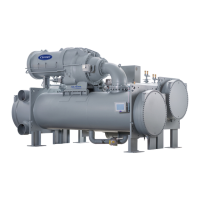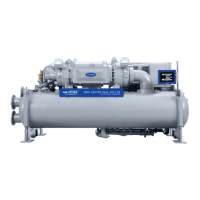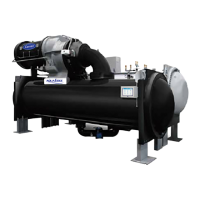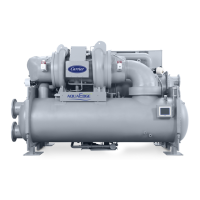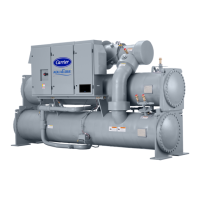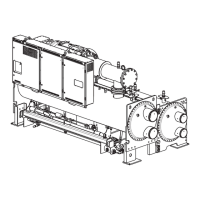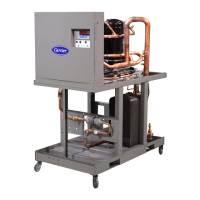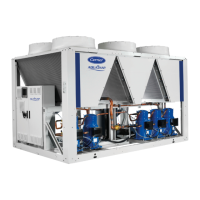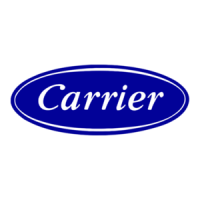30
Table 3 — ICVC Display Data
1. Only 12 lines of information appear on the ICVC screen at any one
time. Press the or softkey to highlight a point
or to view items below or above the current screen. Double-click the
softkey to page forward; double-click the
softkey to page back.
2. To access the information shown in Examples 10 through 26, enter
your 4-digit password after pressing the softkey. If no
softkeys are pressed for 15 minutes, the ICVC automatically logs off
(to prevent unrestricted access to PIC III controls) and reverts to the
default screen. If this happens, you must re-enter your password to
access the tables shown in Examples 10 through 26.
3. Terms in the Description column of these tables are listed as they
appear on the ICVC screen.
4. The ICVC may be configured in English or Metric (SI) units using the
ICVC CONFIGURATION screen. See the Service Operation section,
page 59, for instructions on making this change.
5. The items in the Reference Point Name column do not appear on the
ICVC screen. They are data or variable names used in CCN, Building
Systems Interface (BSI) or Local Equipment Interface (LEI) Module
software (optional). They are listed in these tables as a convenience
to the operator if it is necessary to cross reference CCN/BSI docu-
mentation or use CCN/BSI programs. For more information, see the
CCN literature.
6. Reference Point Names shown in these tables in all capital letters
can be read by CCN and BSI software. Of these capitalized names,
those variables preceded by a * can also be changed (that is, written
to) by the CCN, BSI, LEI, and the ICVC. Variables preceded by a
dagger shall support one time write operations for the ICVC only
when the value is initially zero. Variables preceded by two asterisks
can be changed only from the ICVC. Reference Point Names in lower
case type can be viewed by CCN or BSI only by viewing the whole
table.
7. Alarms and Alerts: An asterisk in the far right field of a ICVC status
screen indicates that the chiller is in an alarm state; an exclamation
point in the far right field of the ICVC screen indicates an alert state.
The asterisk (or exclamation point) indicates that the value on that
line has exceeded (or is approaching) a limit. For more information on
alarms and alerts, see the Alarms and Alerts section, page 23.
8. Index of all ICVC Parameters is shown in Appendix A.
LEGEND
EXAMPLE 1 — ICVC DEFAULT SCREEN
The following data is displayed in the ICVC Default screen.
NOTES:
1. The Evaporator Refrigerant Temperature displayed is the smaller value of EVAP REFRIG LIQUID TEMP or CALC EVAP SAT TEMP.
2. The last three entries are used to indicate operating mode to the PIC III. These values may be forced by the ICVC only.
IMPORTANT: The following notes apply to all Table 3 examples.
1CR
—
Control Relay
CCN
—
Carrier Comfort Network
®
CHL
—
Chilled Liquid
CR
—
Control Relay
CT
—
Current Transformer
I2T
—
Motor Overload
ICVC
—
International Chiller Visual Controller
ECL
—
Entering Chilled Liquid
HGBP
—
Hot Gas Bypass
LCL
—
Leaving Chilled Liquid
LRA
—
Locked Rotor Amps
mA
—
Milliamps
P
—
Pressure
T
—
Temperature
VFD
—
Variable Frequency Drive
WSM
—
Liquid System Manager
° F
—
Temperature in Degrees Fahrenheit
ˆ F
—
Temperature Difference in Degrees Fahrenheit
DESCRIPTION RANGE UNITS
REFERENCE POINT NAME
(ALARM HISTORY)
DISPLAY
(PRIMARY MESSAGE)
(SECONDARY MESSAGE)
(DATE AND TIME)
Compressor Ontime 0 to 500000.0 HOURS C_HRS
Entering Chilled Liquid –40 to 245 °F (°C) ECL
CHL IN
Leaving Chilled Liquid –40 to 245 °F (°C) LCL
CHL OUT
Evaporator Refrigerant Temperature (See Note 1) –40 to 245 °F (°C) ERT_EST
EVAP REF
Entering Condenser Liquid –40 to 245 °F (°C) ECDL
CDL IN
Leaving Condenser Liquid –40 to 245 °F (°C) LCDL
CDL OUT
Condenser Refrigerant Temperature –40 to 245 °F (°C) CRT
COND REF
Oil Pressure Delta P –6.7 to 425 psi (kPa) OIL_PD
OILPRESS
Oil Sump Temp –40 to 245 °F (°C) OILT
OIL TEMP
Percent Line Current 0 to 999 % AMPS_P
% AMPS IN
CCN 0 to 1 CCN
LOCAL 0 to 1 LOCAL
RESET 0 to 1 RESET

